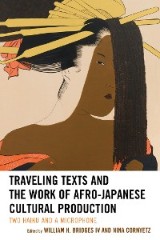Details

Traveling Texts and the Work of Afro-Japanese Cultural Production
Two Haiku and a MicrophoneNew Studies in Modern Japan
|
47,99 € |
|
| Verlag: | Lexington Books |
| Format: | EPUB |
| Veröffentl.: | 24.06.2015 |
| ISBN/EAN: | 9781498505482 |
| Sprache: | englisch |
| Anzahl Seiten: | 294 |
DRM-geschütztes eBook, Sie benötigen z.B. Adobe Digital Editions und eine Adobe ID zum Lesen.
Beschreibungen
<span><span>Traveling Texts and the Work of Afro-Japanese Cultural Production</span><span> analyzes the complex conversations taking place in texts of all sorts traveling between Africans, African Diasporas, and Japanese across disciplinary, geographic, racial, ethnic, linguistic, and cultural borders. Be it focused on the make-up of the blackface </span><span>ganguro</span><span> or the haiku of Richard Wright, Rastafari communities in Japan or the black </span><span>enka</span><span> singer Jero, the volume turns its attention away from questions of representation to ones concerning the generative aspects of transcultural production. The contributors are interested primarily in texts in motion—the contradictory motion within texts, the traveling of texts, and the action that such kinetic energy inspires in readers, viewers, listeners, and travelers. As our texts travel and travail, the originary nodal points that anchor them to set significations loosen and are transformed; the essays trace how, in the process of traveling, the bodies and subjectivities of those working to reimagine the text(s) in new sites moderate, accommodate, and transfigure both the texts and themselves.<br></span></span>
<br>
<span></span>
<br>
<span></span>
<br>
<span></span>
<br>
<span></span>
<span><span>This book analyzes the complex conversations taking place in texts of all sorts traveling between Africans, African diasporas, and Japanese across disciplinary, geographic, racial, ethnic, and cultural borders. </span></span>
<span><span>Part One: Art and Performance</span></span>
<br>
<span><span>Chapter</span><span> </span><span>1: Urban Geishas: Reading Race and Gender in iROZEALb’s Paintings, Crystal Anderson</span></span>
<br>
<span><span>Chapter 2: The Theatrics of Japanese Blackface: Body as Mannequin, Nina Cornyetz</span></span>
<br>
<span><span>Chapter 3: Abbey Lincoln and Kazuko Shiraishi’s Art-Making as Spiritual Labor, Yuichiro Onishi and Tia-Simone Gardner</span></span>
<br>
<span></span>
<br>
<span><span>Part Two: Poetry and Literature</span></span>
<br>
<span><span>Chapter 4: Playing the Dozens on Zen: Amiri Baraka’s Journey from a “Pre-Black” Bohemian Outsider to a “Post-American Low Coup” Poet, Michio Arimitsu</span></span>
<br>
<span><span>Chapter 5: Richard Wright’s Haiku and Modernist Poetics, Yoshinobu Hakutani </span></span>
<br>
<span><span>Chapter 6: In the Beginning: Blackness and the 1960s Creative Nonfiction of Ôe Kenzaburô, William H. Bridges IV</span></span>
<br>
<span><span>Chapter 7: Future-Oriented Blackness in Shōwa Robot Culture—1924 to 1963, Anne McKnight</span></span>
<br>
<span><span> </span></span>
<br>
<span><span>Part Three: Sound, Song, Music</span></span>
<br>
<span><span>Chapter 8: “This Is Who I Am”: Jero and the Polycultural Politics of Black </span><span>Enka</span><span>, Kevin Fellezs</span></span>
<br>
<span><span>Chapter 9: Extending Diaspora: The NAACP and Up-“Lift” Cultures in the Interwar Black Pacific, Shana Redmond </span></span>
<br>
<span><span>Chapter 10: Hip-Hop and Reggae in Recent Japanese Social Movements, Noriko Manabe</span></span>
<br>
<span><span>Chapter 11: Can the Japanese Rap?, Dexter Thomas Jr.</span></span>
<br>
<span><span>Chapter 12: Race, Ethnicity and Affective Community in Japanese Rastafari, Marvin Sterling</span></span>
<br>
<span><span>Chapter</span><span> </span><span>1: Urban Geishas: Reading Race and Gender in iROZEALb’s Paintings, Crystal Anderson</span></span>
<br>
<span><span>Chapter 2: The Theatrics of Japanese Blackface: Body as Mannequin, Nina Cornyetz</span></span>
<br>
<span><span>Chapter 3: Abbey Lincoln and Kazuko Shiraishi’s Art-Making as Spiritual Labor, Yuichiro Onishi and Tia-Simone Gardner</span></span>
<br>
<span></span>
<br>
<span><span>Part Two: Poetry and Literature</span></span>
<br>
<span><span>Chapter 4: Playing the Dozens on Zen: Amiri Baraka’s Journey from a “Pre-Black” Bohemian Outsider to a “Post-American Low Coup” Poet, Michio Arimitsu</span></span>
<br>
<span><span>Chapter 5: Richard Wright’s Haiku and Modernist Poetics, Yoshinobu Hakutani </span></span>
<br>
<span><span>Chapter 6: In the Beginning: Blackness and the 1960s Creative Nonfiction of Ôe Kenzaburô, William H. Bridges IV</span></span>
<br>
<span><span>Chapter 7: Future-Oriented Blackness in Shōwa Robot Culture—1924 to 1963, Anne McKnight</span></span>
<br>
<span><span> </span></span>
<br>
<span><span>Part Three: Sound, Song, Music</span></span>
<br>
<span><span>Chapter 8: “This Is Who I Am”: Jero and the Polycultural Politics of Black </span><span>Enka</span><span>, Kevin Fellezs</span></span>
<br>
<span><span>Chapter 9: Extending Diaspora: The NAACP and Up-“Lift” Cultures in the Interwar Black Pacific, Shana Redmond </span></span>
<br>
<span><span>Chapter 10: Hip-Hop and Reggae in Recent Japanese Social Movements, Noriko Manabe</span></span>
<br>
<span><span>Chapter 11: Can the Japanese Rap?, Dexter Thomas Jr.</span></span>
<br>
<span><span>Chapter 12: Race, Ethnicity and Affective Community in Japanese Rastafari, Marvin Sterling</span></span>
<span><span>This book analyzes the complex conversations taking place in texts of all sorts traveling between Africans, African diasporas, and Japanese across disciplinary, geographic, racial, ethnic, and cultural borders. The volume turns its attention away from questions of representation to ones concerning the generative aspects of transcultural production. The essays trace how, in the process of traveling, the bodies and subjectivities of those working to reimagine the texts transfigure both the texts and themselves.</span></span>
<br>
<span></span>
<br>
<span></span>
<br>
<span></span>
<br>
<span></span>
<span><span>William H. Bridges</span><span> is assistant professor of Japanese and Asian studies at St. Olaf College. <br>Nina Cornyetz is associate professor of interdisciplinary studies at the Gallatin School for Individualized Study, New York University.</span></span>
<br>
<span></span>
<br>
<span></span>
Diese Produkte könnten Sie auch interessieren:

Identifying, Assessing, and Treating Autism at School
von: Stephen E. Brock, Shane R. Jimerson, Robin L. Hansen
Preis: 96,29 €

How to Become an Effective Course Director
von: Bruce W. Newton, Jay H. Menna, Patrick W. Tank
Preis: 64,19 €
-
-
© 2024 media control GmbH
Alle Preise enthalten die gesetzliche Mehrwertsteuer. - AGB
- Impressum
- Datenschutzerklärung
- Kontakt
- FAQ
- Mein Konto
- Home
- Erweiterte Suche
- Widerrufsrecht
- Reader-Software
- Desktop-Ansicht
- Gutschein-Code einlösen
- English
